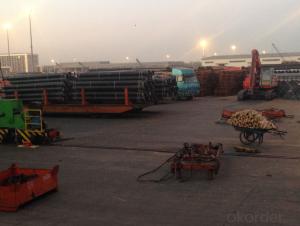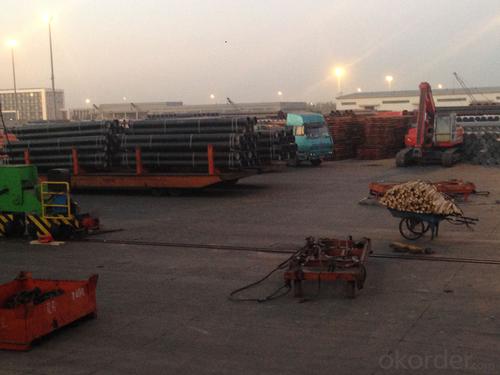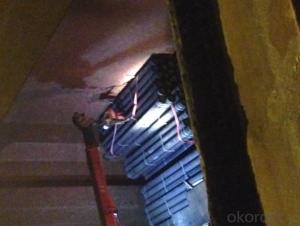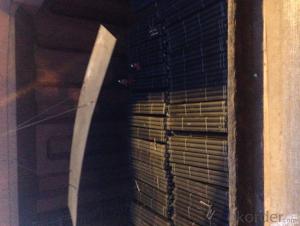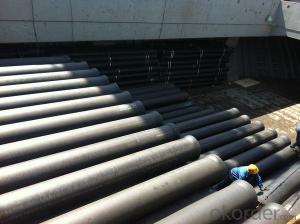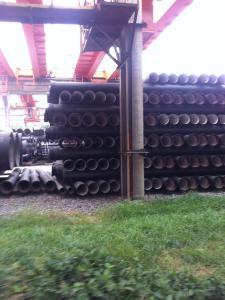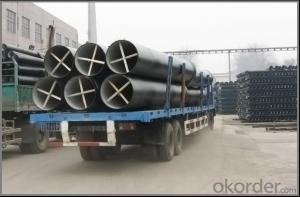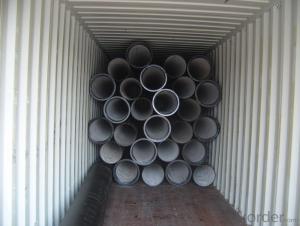DUCTILE IRON PIPES& PIPE FITTINGS C DN100
- Loading Port:
- Tianjin
- Payment Terms:
- TT OR LC
- Min Order Qty:
- 25 m.t
- Supply Capability:
- 30000 m.t/month
OKorder Service Pledge
OKorder Financial Service
You Might Also Like
Material : Ductile Cast Iron
Size Range : DN 80mm to DN 2000mm
Unit Effective Length : 6m or 5.7m
Manufacture Standard: ISO 2531:1998/ EN 545:2006/EN 598:2007
Annual capacity : 200,000 tons
Coating Exterior: Zinc 130g/m2 according to ISO 8179-1 and bitumen coating 70 microns.
Cement Interior: Portland Cement/ High Alumina Cement/ Sulphate Resisting Cement Lining according to ISO 4179
Special requirements on external coating and internal lining can be applied
We also provide accessories such as SBR/EPDM rubber gaskets, lubricant paste, pipe caps, PE sleeves, etc.
Additional Parts:
Each pipe is strictly inspected according to related standard to ensure permanently high performance.
Easy Installation at site and service free for life
Long Service Lifespan
Quotation will arrive you within 24hours once we get your inquiry.
We guarantee offering you a competitive price.
A copy of original inspection reports of pipes will be offered after shipment.
Photos of loading process will be sent to the customer after shipment effect.
We will follow-up the delivery progress after shipment effect and update to the customer on weekly basis.
- Q: Are ductile iron pipes suitable for use in paper mills?
- Yes, ductile iron pipes are suitable for use in paper mills. Ductile iron pipes are known for their strength, durability, and corrosion resistance, making them ideal for handling various fluids, including those used in paper mills. Additionally, their ability to withstand high pressures and temperatures makes them reliable and long-lasting in the demanding operating conditions of a paper mill.
- Q: Are ductile iron pipes suitable for power plant cooling systems?
- Ductile iron pipes are well-suited for power plant cooling systems, offering numerous advantages that render them perfect for such applications. Firstly, their high strength and durability enable them to withstand the immense pressure and heavy loads typically associated with power plant cooling systems. Additionally, these pipes exhibit excellent resistance to corrosion, a vital feature in an environment where water and other cooling fluids continuously flow. Moreover, they boast good thermal conductivity, ensuring efficient heat transfer away from power plant equipment and contributing to the overall cooling process. Lastly, ductile iron pipes are cost-effective compared to other commonly used materials in power plant cooling systems, making them a practical choice. Ultimately, due to their strength, corrosion resistance, thermal conductivity, and cost-effectiveness, ductile iron pipes represent a reliable and suitable option for power plant cooling systems.
- Q: Can ductile iron pipes be used for water main extensions?
- Yes, ductile iron pipes can be used for water main extensions. Ductile iron pipes are known for their strength and durability, making them a suitable choice for water main extensions. They can handle high pressure and provide resistance to corrosion, which is important for ensuring the longevity and reliability of the water distribution system. Additionally, ductile iron pipes have a smooth interior surface, reducing friction and improving water flow efficiency. Overall, ductile iron pipes are commonly used in water infrastructure projects, including water main extensions, due to their favorable mechanical properties and ability to withstand the demands of water distribution systems.
- Q: Are ductile iron pipes suitable for irrigation systems in agricultural fields?
- Yes, ductile iron pipes are suitable for irrigation systems in agricultural fields. Ductile iron pipes have excellent strength, durability, and corrosion resistance, making them ideal for carrying water in irrigation systems. They can withstand high pressure and heavy loads, ensuring reliable water supply to agricultural fields for irrigation purposes.
- Q: What are the typical surge anticipation measures for ductile iron pipe?
- To mitigate potential damage caused by surges or water hammer in ductile iron pipe systems, various techniques can be employed. These measures aim to absorb or redirect sudden pressure changes, preventing pipe rupture or failure. Common surge anticipation measures for ductile iron pipe include: 1. Incorporating air chambers strategically along the pipeline to create a cushion of air that absorbs surge energy. As the pressure wave travels through the pipe, the air compresses, reducing the impact on the pipe and minimizing the risk of damage. 2. Connecting surge tanks, which act as storage reservoirs for excess pressure, to the pipeline. When a surge occurs, the surge tank absorbs the excess water volume, preventing damage to the pipe. The stored water is gradually released back into the system, stabilizing the pressure. 3. Installing surge relief valves in the pipeline to automatically release excess pressure during surge events. These valves open when the pressure exceeds a preset limit, allowing the surge to dissipate harmlessly. Surge relief valves can be adjusted to release the desired amount of pressure, ensuring the safety of the ductile iron pipe. 4. Utilizing water hammer arrestors, which are devices that absorb the shock generated by surges and water hammer. These devices consist of sealed chambers filled with a compressible gas or liquid that absorbs sudden pressure changes. By absorbing the energy, water hammer arrestors protect the ductile iron pipe from potential damage. 5. Using surge suppressors, devices that regulate the flow of water during surge events. Surge suppressors are designed to reduce the speed at which surges travel through the pipe, minimizing the impact on the system. These devices can be installed at critical points in the pipeline to prevent damage to the ductile iron pipe. To determine the most suitable surge anticipation measures for ductile iron pipe installations, it is important to consider the specific requirements of the pipeline system and consult experienced engineers or industry professionals.
- Q: Can ductile iron pipes be used for underground irrigation systems?
- Yes, ductile iron pipes can be used for underground irrigation systems. Ductile iron pipes are commonly used in various applications, including water supply and distribution systems. They are known for their strength, durability, and resistance to corrosion, making them suitable for underground installations. Additionally, ductile iron pipes have excellent pressure-bearing capacity and can withstand the high pressures often required for irrigation systems. However, it is important to ensure proper installation and maintenance to prevent any damage or leaks in the system.
- Q: Ductile iron pipe is how many years warranty
- Ductile iron pipe is a kind of cast iron pipe. In quality, the spheroidization of cast iron pipes is controlled to be 1-3 (spheroidization rate 80%), so the mechanical properties of the material have been better improved, with the nature of iron and the properties of steel. Ductile cast iron pipe after annealing, the microstructure is ferrite and pearlite, good mechanical properties, excellent corrosion resistance, good ductility, good sealing effect, simple installation, mainly for municipal, industrial and mining enterprises, water supply, gas, oil etc..
- Q: Can ductile iron pipe be used for oil and gas transmission pipelines?
- Ductile iron pipe is a suitable choice for oil and gas transmission pipelines due to its many advantageous properties. With its high tensile strength, it can withstand the pressures and stresses involved in this application. Moreover, ductile iron pipe exhibits excellent corrosion resistance, which is further improved by protective coatings on its exterior. In addition, its durability and longevity ensure the reliability of oil and gas transmission pipelines. Overall, ductile iron pipe offers a reliable and cost-effective solution for oil and gas transmission pipelines.
- Q: How are ductile iron pipes different from cast iron pipes?
- Ductile iron pipes are different from cast iron pipes in terms of their composition and properties. Ductile iron pipes are made from a type of cast iron that has been treated with magnesium to improve its strength and flexibility. This makes ductile iron pipes more durable, impact-resistant, and less prone to cracking or breaking compared to traditional cast iron pipes. Additionally, ductile iron pipes have a higher tensile strength, allowing them to withstand higher internal and external pressures. In summary, ductile iron pipes are a more modern and advanced version of cast iron pipes, offering improved performance and longevity.
- Q: How do ductile iron pipes perform in freeze-thaw cycles?
- Ductile iron pipes perform exceptionally well in freeze-thaw cycles. The material properties of ductile iron, such as its high tensile strength and excellent impact resistance, make it highly resistant to the stresses caused by freeze-thaw cycles. Unlike other materials, ductile iron pipes can withstand the expansion and contraction that occurs during freezing and thawing without cracking or breaking. One of the key reasons why ductile iron pipes excel in freeze-thaw conditions is their ability to absorb and dissipate stresses. The high ductility of the material allows it to deform slightly under stress, thereby releasing the built-up pressure and preventing any damage to the pipe. This characteristic ensures that the pipes can handle the repeated cycles of freezing and thawing without compromising their structural integrity. Additionally, ductile iron pipes have a protective and durable coating, such as cement mortar lining or polyethylene encasement, which further enhances their resistance to freeze-thaw cycles. These coatings provide an additional layer of protection and prevent water from coming into direct contact with the iron, reducing the potential for corrosion. Furthermore, ductile iron pipes have a long service life, typically exceeding 100 years. This longevity is attributed to the material's inherent strength and resistance to various environmental factors, including freeze-thaw cycles. The pipes' ability to withstand these cycles without significant damage ensures the reliability and durability of the water distribution system, even in areas prone to freezing temperatures. In conclusion, ductile iron pipes are highly reliable and perform exceptionally well in freeze-thaw cycles. Their high tensile strength, impact resistance, ability to absorb stresses, and protective coatings make them a preferred choice for water distribution systems in regions with harsh winter conditions.
Send your message to us
DUCTILE IRON PIPES& PIPE FITTINGS C DN100
- Loading Port:
- Tianjin
- Payment Terms:
- TT OR LC
- Min Order Qty:
- 25 m.t
- Supply Capability:
- 30000 m.t/month
OKorder Service Pledge
OKorder Financial Service
Similar products
Hot products
Hot Searches
Related keywords
